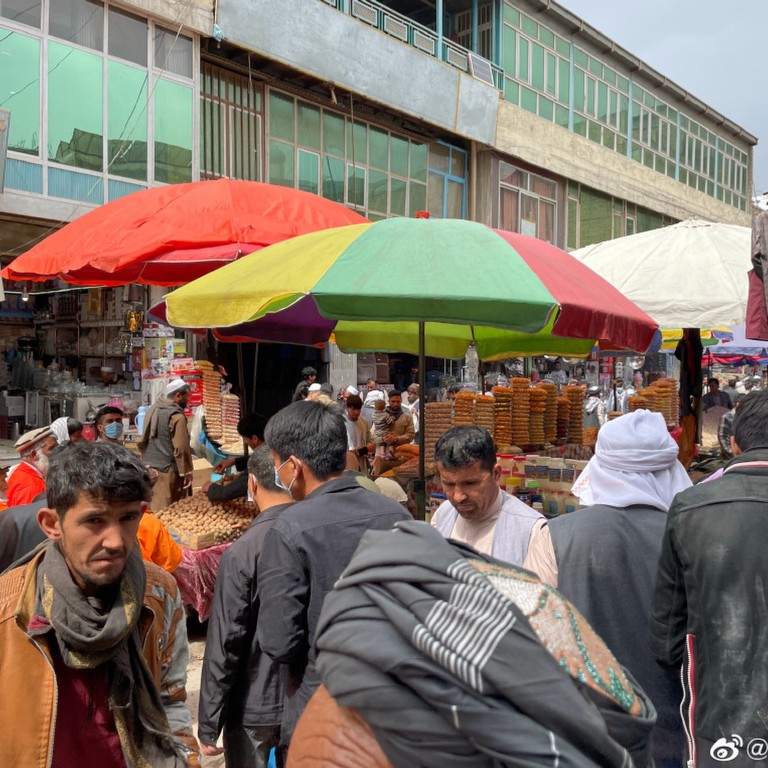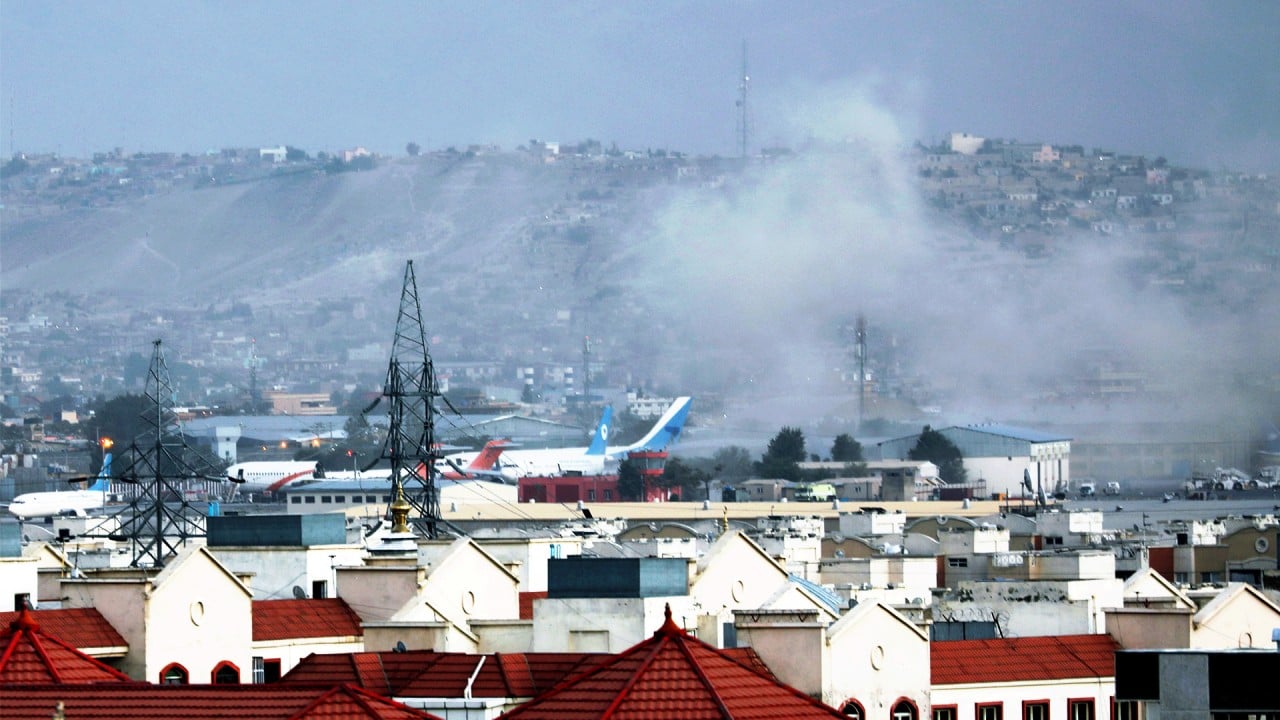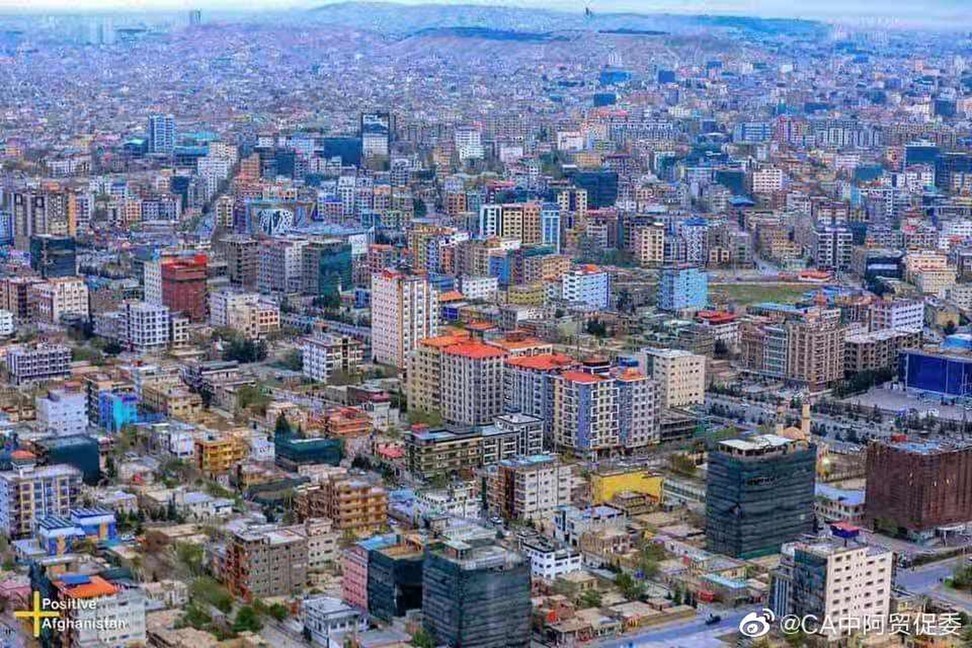
Stay or go? The tough choices for Chinese businesspeople in Afghanistan
- Amid the turmoil of the American departure and the Taliban takeover, shops have shut and the ‘rules of the game have been broken’
- The new regime is offering assurances but much will depend on what Beijing does next
Yu Yong is at a business crossroads.
The 48-year-old Kabul-based trader has been dealing in gemstones, medical supplies and stationery in the Afghan capital for the last four years and planned to stay for the long haul.
Amid the chaos sweeping the Central Asian nation and the fear of a return of Sharia law, Yu is calculating the risk of staying in operation.
“Basically business has been suspended now,” he said.
The Taliban have sought to reassure the community that it will be business as usual but for Yu and others there is one big sign to watch for: whether China will recognise the militant group.

02:30
At least 60 killed by explosions outside Kabul airport, Afghan health official says
Yu said that soon after the Taliban took control of Kabul, fighters from the group visited Chinese businesses, giving the owners a document to certify that their operations were legitimate and would be protected.
“They even told us that we could contact them when we are in trouble,” he said. “The Taliban people, at least those in Kabul, are maintaining some discipline, and they haven’t robbed people even though there are food shortages.
“At present, it seems the Taliban has been implementing the policies they declared fairly well, but it’s hard to say how long this will last.”
Why China is in no rush to endorse the Taliban in Afghanistan
Yu Minghui, director of the China Arab Economic and Trade Promotion Committee, had a similar experience.
“The commander of the district came to visit us in Kabul’s Chinatown, saying that they were willing to help if we had any difficulties,” said Yu Minghui, who has been in business in Afghanistan for nearly two decades.
“He said that they would help maintain order in town, and wouldn’t charge us any money like the previous police force, adding that they didn’t even need us to supply food.”
But the transition has had a huge impact on Chinese businesses, with shops shutting down “to avoid being robbed amid the chaos”.
“The previous rules of the game have all been broken.”

01:45
Photos of women outside Kabul salons defaced after Taliban seizes Afghanistan
The Taliban has sought to strike a moderate tone to distinguish itself from the hardline approach of two decades ago. It has vowed to maintain women’s rights and media freedom and cut ties with terror groups.
While this might be the case in the short term, the future for the remaining Chinese businesspeople in the city rests on a combination of longer term factors.
One of those factors is foreign sanctions, which were at the top of the agenda on Tuesday when leaders from the Group of 7 nations held a meeting. While they did not roll out any immediate measures against the Taliban, they agreed to take a unified approach on whether to recognise the regime.
To Yu Minghui, the impact of such sanctions would be regressive.
“Afghanistan’s economic situation is backward and Western sanctions would make it even worse,” he said.
Kabul airport attack sends message to Taliban not to work with US, Chinese expert says
Nevertheless, the real make-or-break factor for the traders is whether Beijing will recognise the Taliban regime.
“One main issue for us is the attitude of the Chinese government, and whether it will recognise the Taliban,” Yu Yong said. “If China does not recognise it, we will have to leave.”
Beijing has yet to make a statement either way on the Taliban but has continued to engage with representatives of the group.
China gave a Taliban delegation a high-profile reception in July, calling it a pivotal force of the country and supporting its role in Afghanistan’s security and reconstruction.
And on Tuesday, a Taliban delegation met Chinese ambassador Wang Yu in Kabul.
While most nations have evacuated their diplomatic personnel, China is among the few countries whose embassy remains open.
China’s Ministry of Commerce said on Thursday that China was willing to support the country’s reconstruction and help boost its development.
According to ministry spokesman Gao Feng, the trade volume between China and Afghanistan reached over US$300 million in the first half of this year, a year-on-year increase of 44 per cent. By the end of June, China had invested a total of US$430 million in Afghanistan.
But the Afghan economy has been dependent on international assistance, which has been severed since the takeover. The International Monetary Fund has blocked the country’s access to financing due to “a lack of clarity within the international community” regarding the recognition of the new regime. The United States has frozen around US$7 billion in Afghanistan’s assets held at the US Federal Reserve.
What is the Wakhan Corridor and why is China worried about it?
Observers said that China might consider giving help including humanitarian aid, but this would largely depend on the scope of possible sanctions of Western nations as well as the United Nations.
“Foreign aid and drugs are pillars of Afghanistan’s economy. Since Western aid has been largely blocked and the Taliban has vowed to ban drug production, the country is bound to fall into extreme economic difficulties, which may lead to a humanitarian crisis,” said Yan Wei, a professor at the Institute of Middle Eastern Studies at Northwest University in China.
“In that case, China may send in basic necessities to help.
“But any resolutions by the US Security Council will be major factors in determining Chinese aid and investment in Afghanistan.
“For now the council hasn’t passed any additional resolution regarding sanctions against the Taliban, but if it does, China will definitely uphold it. Moreover, if the US sanctions restrict certain aspects of economic aid and even humanitarian assistance, it will be difficult for China to provide assistance.”
Huang Minxing, also from Northwest University, agreed that foreign sanctions would greatly restrict the type of economic aid China could offer, but said the West was more interested in using sanctions as a negotiating tool than introducing them.
“Previously China used to help the country build dams, factories, farms as well as hospitals. These areas are less likely to be sanctioned, so assistance in these areas is also possible now,” Huang said.
“The West is unlikely to truly impose economic sanctions on the Taliban, as Europe is already worried about the refugee issue in Afghanistan and the sanctions may lead to further deterioration of it.
“The G7 is more likely to use the possible sanctions as a bargaining chip, for instance, to make the Taliban agree to delay the US withdrawal deadline or influence its domestic policies in the future.”
Russia seeks to assure India of partnership as Moscow, Beijing align positions on Afghanistan
Despite the turmoil, private entrepreneurs seem to be optimistic about embracing Afghanistan’s post-war reconstruction.
Yu Yong said that if the Chinese government recognised the Taliban regime, he would definitely expand his business in Afghanistan.
“There are countless business opportunities in a post-war country like this, the most prominent of which is mining,” he said.
“This country is full of mineral resources that are almost untouched. Chances are the Taliban will strongly support development of the mining industry because the regime desperately needs money. I can sell it to China, which needs these minerals.”
Yu Minghui agreed there were opportunities: “No matter who is in charge, as long as it needs economic development and trade, China and Chinese businesspeople will be indispensable to them.
“With the accumulation of connections over the years, no matter who is in power, we can always find a way to deal with it.”



